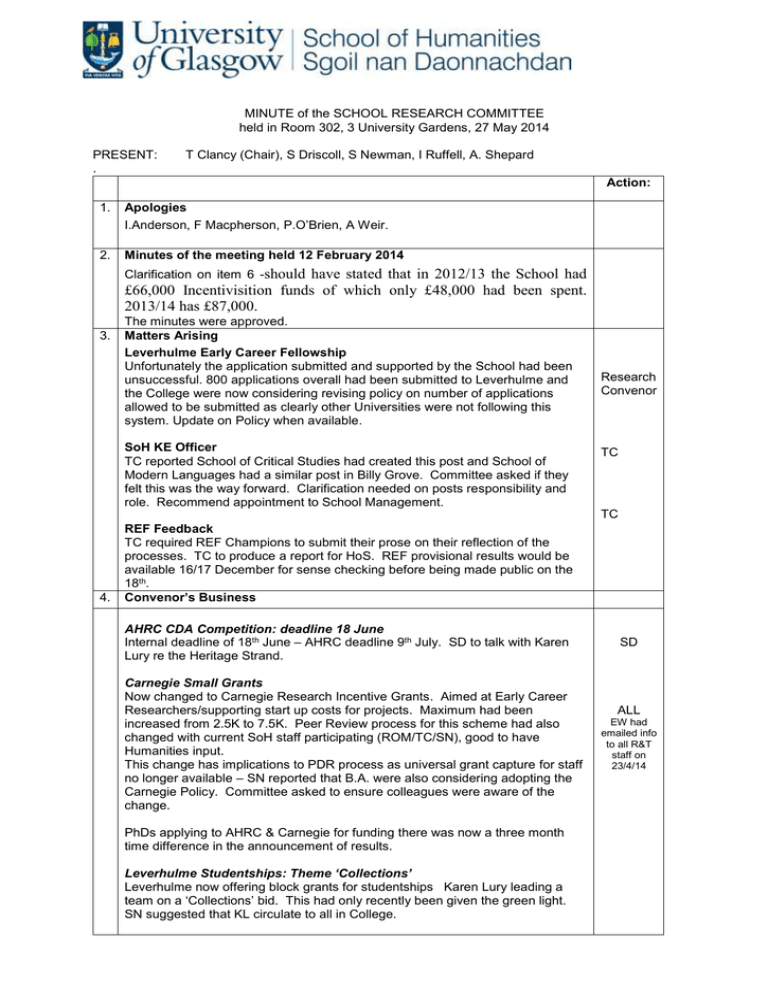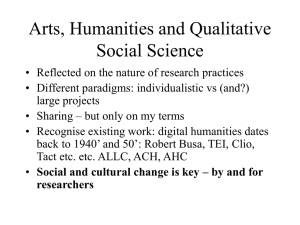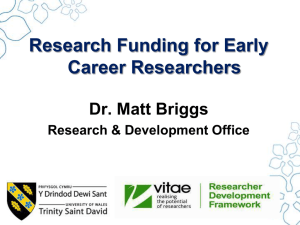MINUTE of the SCHOOL RESEARCH COMMITTEE PRESENT:
advertisement

MINUTE of the SCHOOL RESEARCH COMMITTEE held in Room 302, 3 University Gardens, 27 May 2014 PRESENT: . T Clancy (Chair), S Driscoll, S Newman, I Ruffell, A. Shepard Action: 1. Apologies I.Anderson, F Macpherson, P.O’Brien, A Weir. 2. Minutes of the meeting held 12 February 2014 Clarification on item 6 -should have stated that in 2012/13 the School had £66,000 Incentivisition funds of which only £48,000 had been spent. 2013/14 has £87,000. 3. The minutes were approved. Matters Arising Leverhulme Early Career Fellowship Unfortunately the application submitted and supported by the School had been unsuccessful. 800 applications overall had been submitted to Leverhulme and the College were now considering revising policy on number of applications allowed to be submitted as clearly other Universities were not following this system. Update on Policy when available. SoH KE Officer TC reported School of Critical Studies had created this post and School of Modern Languages had a similar post in Billy Grove. Committee asked if they felt this was the way forward. Clarification needed on posts responsibility and role. Recommend appointment to School Management. Research Convenor TC TC 4. REF Feedback TC required REF Champions to submit their prose on their reflection of the processes. TC to produce a report for HoS. REF provisional results would be available 16/17 December for sense checking before being made public on the 18th. Convenor’s Business AHRC CDA Competition: deadline 18 June Internal deadline of 18th June – AHRC deadline 9th July. SD to talk with Karen Lury re the Heritage Strand. Carnegie Small Grants Now changed to Carnegie Research Incentive Grants. Aimed at Early Career Researchers/supporting start up costs for projects. Maximum had been increased from 2.5K to 7.5K. Peer Review process for this scheme had also changed with current SoH staff participating (ROM/TC/SN), good to have Humanities input. This change has implications to PDR process as universal grant capture for staff no longer available – SN reported that B.A. were also considering adopting the Carnegie Policy. Committee asked to ensure colleagues were aware of the change. PhDs applying to AHRC & Carnegie for funding there was now a three month time difference in the announcement of results. Leverhulme Studentships: Theme ‘Collections’ Leverhulme now offering block grants for studentships Karen Lury leading a team on a ‘Collections’ bid. This had only recently been given the green light. SN suggested that KL circulate to all in College. SD ALL EW had emailed info to all R&T staff on 23/4/14 SRA Competition results. The School had experienced relative success. Critical Studies £1,250; Humanities £1,600; SML £3,000 Feedback on the amount given to SML – No overhead income to call upon; strong steer from SML re what should be funded, not leaving it to College to decide. SML praised for their approach. Committee agreed that this was a lot of power to have in one persons domain. SD felt this was homogeneous, would be more difficult to balance within Humanities in comparison to English. Humanities would need a clearer system for ranking; proportional distribution; quality of proposals; filter system. TC to ask ROM what he thinks the College may adapt as a policy as it seemed a lot of work for the amounts of money being awarded. Open Access TC asked Committee to ensure that all colleagues were aware that it is now policy that the Library must be notified at acceptance stage for all Journals. Research Leave Changes Main issues – strengthen the role of Schools. Case being aligned with strategic areas – back to Subject Heads providing the statement, School to make sure research leave available. Longer lead in time for school applicants – heads of subject. AHRC potential buy outs; body off most years; no one is entitled to research leave, not enough bodies or resources. Consequences should be thought through and Subject area should have a plan. Leave should be focused. TC had been surprised as his understanding was that need for applications for externally funded income was going to be lightened not strengthened. SN explained that some types of research leave did not always require funding but did need the time - grant income received a year ago, now need the leave to write the book – Scottish Historians often have the research facilities on their doorstep, no need for travel – endowments funding travel. Making people apply for external funding before research leave approved in certain cases was an unnecessary time consuming exercise. REACH – TC asked Committee to make sure colleagues were aware of REACH http://www.gla.ac.uk/colleges/arts/knowledge-exchange/newsletter/reach04/ and encourage them to pass on to Fraser Rowan any information on projects that staff & students are undertaking with external partners. 5. Incentivisation This item was on the Agenda for the School Management Meeting (28/5/14). Substantially it was the same policy being proposed. The 6 main grant holders had been circulated and their comment as PI requested. Currently there was a mixed economy of spend – current or future projects – sub areas – M.Litt/PhD/Centres. Committee felt that current scheme of incentivisation worked. PI needs flexibility – timescale & what they can use the money for – restriction of spend, i.e. equipment as some Research Councils do not fund these items. Suggestions:Meetings re how budgeting works with PIs/Head of Subjects. Being able to carry over funds - restraint of the financial year. 50% research income – equitable process of distribution - £350 per head 4 new members of staff were surprised that they were not given an individual research budget as is the policy in most other Universities. Suggestion of looking at the scientist model. Process of gaining a small amount of money too time consuming IR – benefit to UoA – through Catherine Steel’s grant the subject area had been able to produce a 5 year plan. Incentivisation to go for big grants is the strategic benefit to a UoA day to day basis, free up research time which otherwise would be used for tutorials etc. Salary recoup as an incentivisation – CCA/CS already have something similar in ALL place. Morale issue – getting something is better than getting nothing. Perhaps a trial run for 2 years. Centres relied on PIs using incentivisation for strategic instead of individual initiative. Give power to make decisions there and then instead of applications. Stream of money going into Centres would be reduced. 6. A.O.C.B There was no other business. As this was TC last Research Committee meeting as Convenor, he thanked all for their work, especially over REF 7. Date of Next Meeting


